|
Limitar tu búsqueda
[+–] Creator
- Abdul-Hamid, Husein (2)
- Calónico, Sebastián (2)
- Camillo Rosati, Furio (2)
- Crosta, Facundo (2)
- De la Torre, Rodolfo (1)
- Di Gresia, Luciano (2)
- Dueñas, Ximena (2)
- Fazio, María Victoria (2)
- García Moreno, Vicente (2)
- Jarillo Rabling, Brenda (2)
- López-Calva, Luis Felipe (2)
- Motiram, Sripad (2)
- Muñoz Izquierdo, Carlos (2)
- Nugent, Jeffrey B. (2)
- Patrinos, Harry Anthony (6)
- Porto, Alberto (2)
- Ripani, Laura (2)
- Rossi, Mariacristina (2)
- Santibáñez, Lucrecia (2)
- Santos, María Emma (2)
- Sosa Escudero, Walter (2)
- Álvarez, Jesús (2)
- Ñopo, Hugo (2)
[+–] Editorial
[+–] Fecha
[+–] Formato
[+–] Idioma
[+–] Tipo de documento
[+–] Tipo de recurso
|

|
|
Polarización económica y gobernabilidad en México
Este ensayo evalúa hipótesis alternativas sobre los orígenes de las recientes rebeliones sociales en México y examina la teoría de que un grave aumento en la pobreza precedió los conflictos. Una consecuencia de lo anterior ha sido que los intentos realizados por el gobierno mexicano para desactivar los factores económicos que, en su opinión, llevaron a los levantamientos sociales no...
|
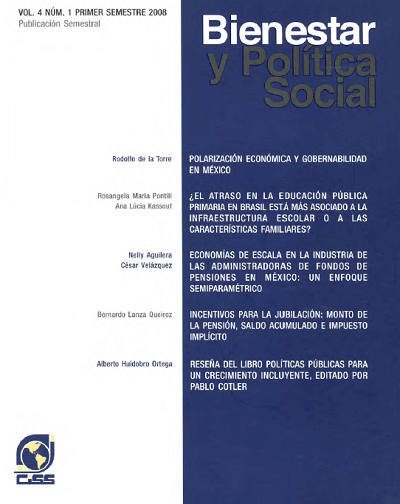
|
|
|
|

|
|
"La Nocturna": study of educational choice in Colombia
This study uses data from Colombia’s 2003 Encuesta de Calidad de Vida to examine how well do electricity strata (proxy for socioeconomic status) explain the choice decision for type of institution and session attended. In the model of choice by type – private vs. public universities – I find that as the electricity strata increases, the marginal probability of enrolling in a public university...
|
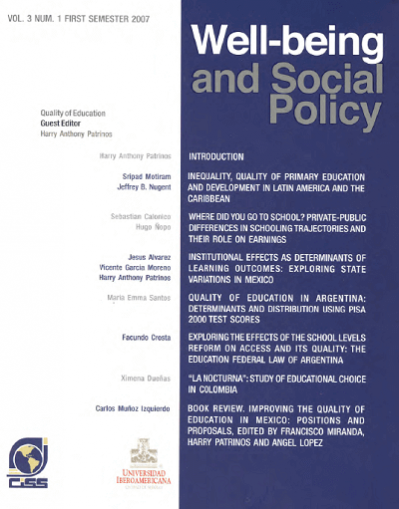
|
|
|
|

|
|
Exploring the effects of the school levels reform on access and its quality: the Education Federal Law of Argentina
Over the last decade, Argentina embarked on a broad education reform, the Federal Education Law (LFE), being its main objective to expand access to basic education, mainly, by a new organization of the schooling level structure with the extension of mandatory schooling from 7 to 10 years. The provinces reactions were heterogeneous. We try to evaluate the relationship among the LFE and access and...
|
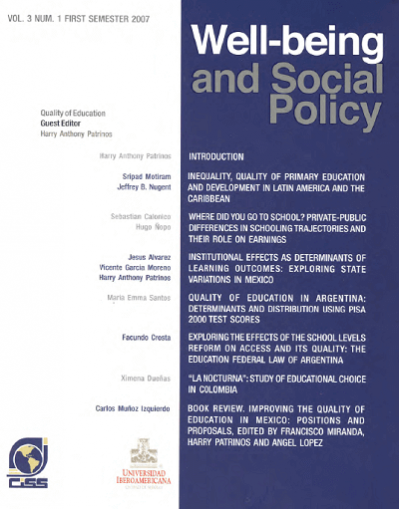
|
|
|
|

|
|
Quality of education in Argentina: determinants and distribution using PISA 2000 test scores
In this paper we study the determinants and distribution of learning outcomes in Argentina I measured by PISA 2000 reading and math test scores. To do that, we estimate education production functions at the mean of the distribution using survey regressions and at different parts of the score 's distribution with quantile regressions. In terms of educational policy aimed at improving learning...
|
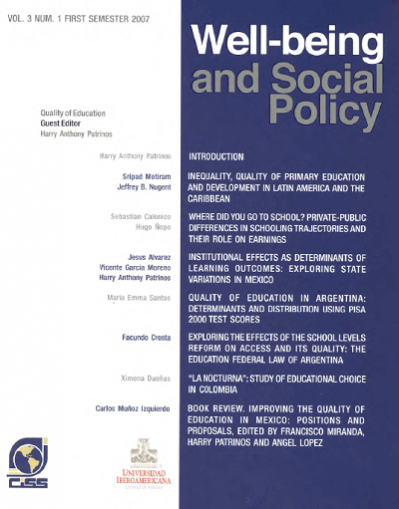
|
|
|
|

|
|
Institutional effects as determinants of leaning outcomes: exploring state variations in Mexico
We use the PISA 2003 student-level achievement database for Mexico to estimate state education production functions. Student characteristics, family background, home inputs, resources and institutions are controlled for. We take advantage of the state-level variation and representative sample to analyze the impact of institutional factors such as state accountability systems and the role of...
|
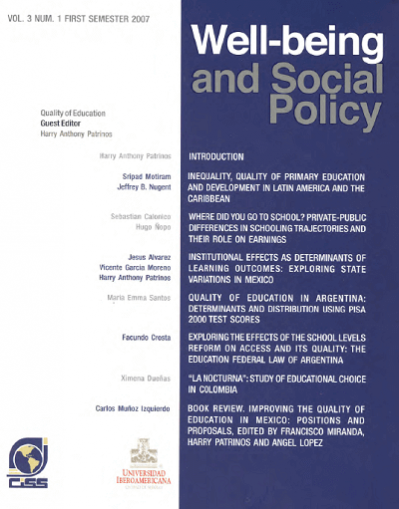
|
|
|
|

|
|
Where did you go to school? Private-public differences in schooling trajectories and their role of earnings
The private provision of educational services has been representing an increasing fraction of the Peruvian schooling system, especially in recent last decades. While there have been many claims about the differences in quality between private and public schools, there is no complete assessment of the different impacts of these two type of providers on the labor markets. This paper is an attempt...
|
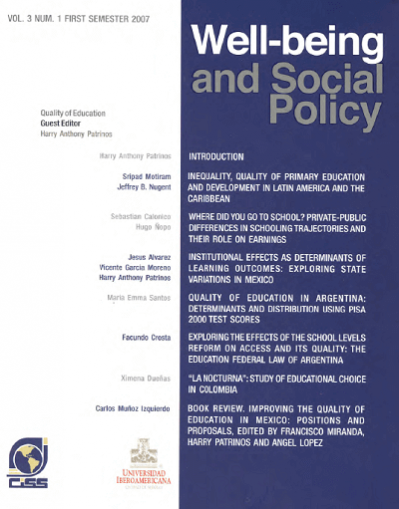
|
|
|
|

|
|
Inequality, quality of primary education and development in Latina America and the Caribbean
This paper draws on a political economy model to hypothesize that the quality of education is likely to be lowered by both economic and political inequalities. In particular, we utilize a panel data set across countries and over time to test the applicability of the hypothesis to quality of education indicators at the primary level. Among the four specific indicators of primary education assigned...
|
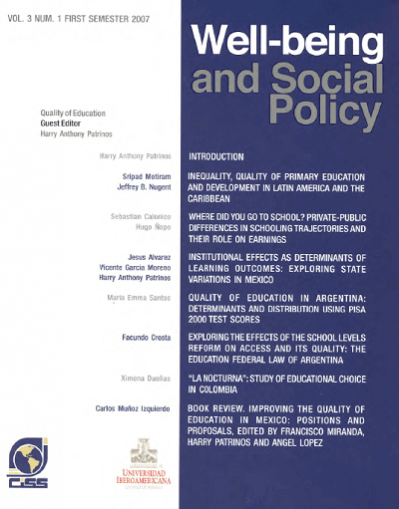
|
|
|
|

|
|
Introduction (about the international conference on "The quality of education in Latin America and the Caribbean")
The Inter-American Conference on Social Security (CISS) and Universidad Iberoamericana (UIA) co-hosted an international conference on "The Quality of Education in Latin America and the Caribbean" in February 2007. The main obj ective of the conference was to examine quality of education in the region, the determinants of learning, policy and program evaluation, and the impact of quality of...
|
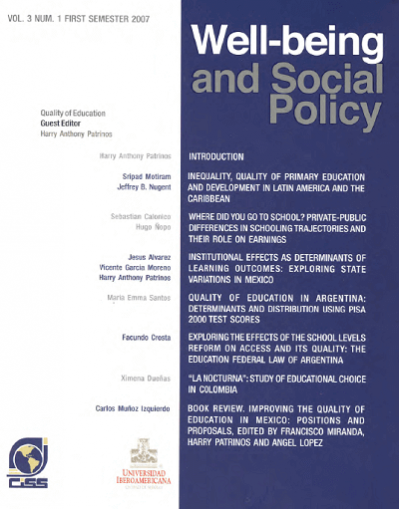
|
|
|
|

|
|
Diversity and equity: Review to indigenous peoples, poverty and human development in Latina America: 1994-2004, edited by Gillete Hall and Harry A. Patrinos
The evolution of specific welfare-related indicators for these indigenous populations during the last decade is the theme of this important book. The study declares to have four guiding questions,
to wit:
1. Have income poverty rates increased or decreased among Indigenous Peoples over the past decade, and what are the main determinants of observed trends?, How does this evolution compare to...
|
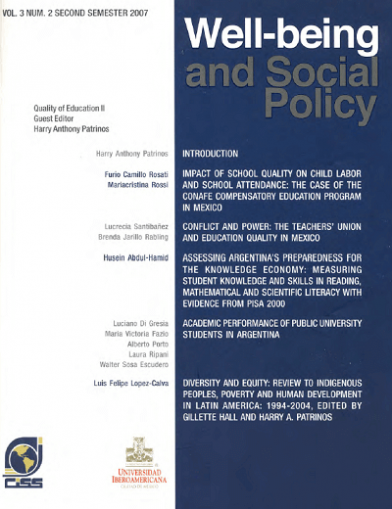
|
|
|
|
|